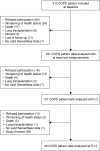No impact of exacerbation frequency and severity on the physical activity decline in COPD: a long-term observation
- PMID: 30863043
- PMCID: PMC6388775
- DOI: 10.2147/COPD.S188710
No impact of exacerbation frequency and severity on the physical activity decline in COPD: a long-term observation
Abstract
Introduction: COPD exacerbations are associated with a concomitant profound reduction in daily physical activity (PA). Thereby, exacerbation frequency and severity may have an amplifying effect. Whether the reduced level of PA returns to the level prior to exacerbation or has a sustained negative impact on activity behavior over time is unclear.
Methods: The number of steps per day over 1 week, as a measure of daily PA, was assessed annually in a cohort of patients with COPD. Exacerbation frequency and severity were documented. Uni- and multivariate mixed effect models were used to investigate associations between change in number of steps per day (dependent variable) and exacerbations. Stratification by possible confounders was performed.
Results: One hundred and eighty one COPD patients (median [quartile] age 64 [59/69] years, 65% male, median [quartiles] FEV1 % pred. 46 [33/65]) suffered a total of 273 exacerbations during the observation period (median [quartiles] follow-up time of 2.1 [1.6/3.1] years). Neither the frequency nor the severity of exacerbations was significantly related to the overall decline in PA over time. Stratification by different possible confounders such as age, sex and disease severity did not yield a subgroup in which exacerbations enhance the decrease in PA over time.
Conclusion: The drop in PA during the phase of an acute exacerbation seems not to be a lasting phenomenon leading to a fundamental change in activity behavior.
Trial registration: www.ClinicalTrials.gov, NCT01527773.
Keywords: COPD; daily physical activity; exacerbation.
Conflict of interest statement
Disclosure The authors report no conflicts of interest in this work.
Figures


Similar articles
-
Physical activity declines in COPD while exercise capacity remains stable: A longitudinal study over 5 years.Respir Med. 2018 Aug;141:1-6. doi: 10.1016/j.rmed.2018.06.013. Epub 2018 Jun 18. Respir Med. 2018. PMID: 30053953 Clinical Trial.
-
Physical activity and the frequency of acute exacerbations in patients with chronic obstructive pulmonary disease.Lung. 2015 Feb;193(1):63-70. doi: 10.1007/s00408-014-9673-7. Epub 2014 Dec 13. Lung. 2015. PMID: 25503750
-
Tracking Real-World Physical Activity in Chronic Obstructive Pulmonary Disease Over One Year: Results from a Monocentric, Prospective, Observational Cohort Study.Int J Chron Obstruct Pulmon Dis. 2024 Aug 27;19:1921-1929. doi: 10.2147/COPD.S469984. eCollection 2024. Int J Chron Obstruct Pulmon Dis. 2024. PMID: 39219563 Free PMC article.
-
Determinants of annual change in physical activity in COPD.Respirology. 2017 Aug;22(6):1133-1139. doi: 10.1111/resp.13035. Epub 2017 Mar 30. Respirology. 2017. PMID: 28370700
-
The likelihood of improving physical activity after pulmonary rehabilitation is increased in patients with COPD who have better exercise tolerance.Int J Chron Obstruct Pulmon Dis. 2018 Oct 24;13:3515-3527. doi: 10.2147/COPD.S174827. eCollection 2018. Int J Chron Obstruct Pulmon Dis. 2018. PMID: 30498342 Free PMC article.
Cited by
-
Advanced nursing practice in COPD exacerbations: the solution for a gap in Switzerland?ERJ Open Res. 2020 Jun 15;6(2):00354-2019. doi: 10.1183/23120541.00354-2019. eCollection 2020 Apr. ERJ Open Res. 2020. PMID: 32577416 Free PMC article.
-
Exacerbations and Changes in Physical Activity and Sedentary Behaviour in Patients with Bronchiectasis after 1 Year.J Clin Med. 2021 Mar 12;10(6):1190. doi: 10.3390/jcm10061190. J Clin Med. 2021. PMID: 33809173 Free PMC article.
-
Walking on common ground: a cross-disciplinary scoping review on the clinical utility of digital mobility outcomes.NPJ Digit Med. 2021 Oct 14;4(1):149. doi: 10.1038/s41746-021-00513-5. NPJ Digit Med. 2021. PMID: 34650191 Free PMC article.
-
Investigating the prognostic value of digital mobility outcomes in patients with chronic obstructive pulmonary disease: a systematic literature review and meta-analysis.Eur Respir Rev. 2023 Nov 22;32(170):230134. doi: 10.1183/16000617.0134-2023. Print 2023 Dec 31. Eur Respir Rev. 2023. PMID: 37993126 Free PMC article.
References
-
- Burge S, Wedzicha JA. COPD exacerbations: definitions and classifications. Eur Respir J Suppl. 2003;41:46S–53S. - PubMed
-
- Seemungal TAR, Donaldson GC, Paul EA, Bestall JC, Jeffries DJ, Wedzicha JA. Effect of exacerbation on quality of life in patients with chronic obstructive pulmonary disease. Am J Respir Crit Care Med. 1998;157(5):1418–1422. - PubMed
-
- Groenewegen KH, Schols AM, Wouters EF. Mortality and mortality-related factors after hospitalization for acute exacerbation of COPD. Chest. 2003;124(2):459–467. - PubMed
-
- Pitta F, Troosters T, Probst VS, Spruit MA, Decramer M, Gosselink R. Physical activity and hospitalization for exacerbation of COPD. Chest. 2006;129(3):536–544. - PubMed

